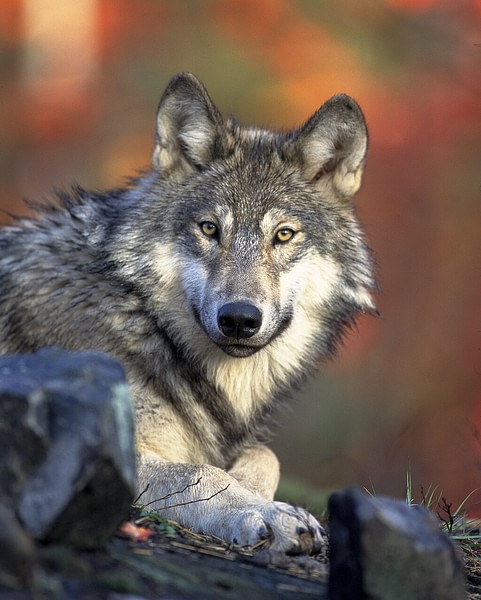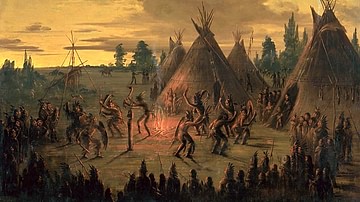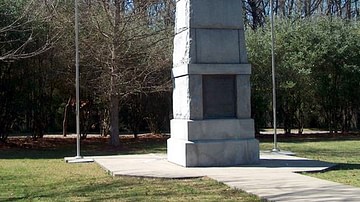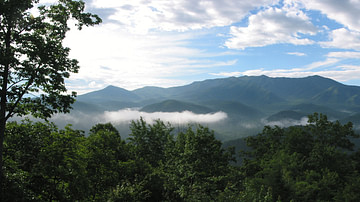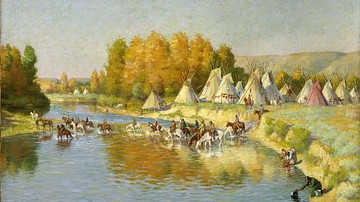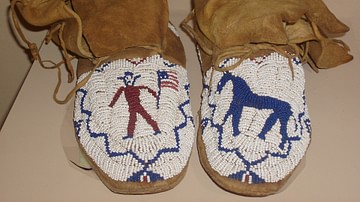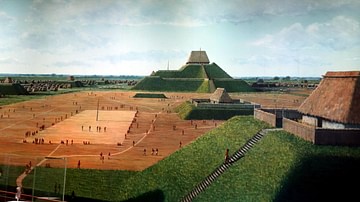The Unseen Helpers is a Cherokee tale on the importance of kindness. Generosity is a central cultural value of the Cherokee nation, as it is with Native American nations generally, and is regarded as especially praiseworthy when the giver does so without expectation of reward or recognition, simply because it is the right thing to do.
This concept is not unique to the Cherokee nation but is common to all Native peoples of North America. A person is expected to offer kindness without expectation of reward, in the same way the Great Spirit has given all good gifts to humanity. In Cherokee belief, the Creator God, Unetlanvhi, freely gives to all living things, and so, in honoring the Creator, one should do likewise as much as one is able to.
The Unseen Helpers illustrates this concept, subtly, as the reason for the help offered to the central character is not given until the end of the story. There is no date of composition for the story as it was passed down through oral tradition by the Cherokee storytellers for centuries until it was committed to writing in the late 19th century, but the tale is still told and remains as popular in Cherokee communities today as it was in the past.
Kindness & Spirit Beings
According to Cherokee belief, in giving without expectation of reward, one will receive unexpected blessings, often in times of greatest need. Offering food, clothing, or assistance to others, is simply expected, and should be understood as a reward in itself, but, in giving to others, one might also receive further benefits. In the Cherokee Ulunsuti tales, the story of The Red Man and the Uktena exemplifies this concept. A hunter, out with his brother in the mountains, comes across a man coiled in the grip of a large uktena snake and saves him. The man turns out to be a supernatural entity, the Red Man of the Lightning, who then rewards the hunter with the gift of the mystical jewel from the uktena snake which, first, saves his brother from death and, secondly, allows the hunter to find game whenever he goes out on a hunt.
Kindness, generosity, to others not only applies to fellow humans but to all living things, plants and animals, and the Cherokee understanding is that kindness shown to non-humans is just as important as human-to-human interaction as there is no reason to believe that people are more important than animals or plants. Further, although kindness should be shown to animals as a matter of course, there is also always the possibility that the creature one feeds or helps is actually a spirit being from a higher realm. Scholar Larry J. Zimmerman comments:
Not only do landforms, plants, and animals have a spirit, they can actually be a spirit. An eagle is an eagle, but it can also be a thunderbird with special powers for protection; coyote is a coyote, but it can also be a manifestation of the trickster, willing to lead a human or other animal astray or teach them a lesson. It is imperative for people who have to live alongside these multitudinous spirits, to know this and behave accordingly. If one obeys certain rules, there may be benefits; if one doesn't, there may be dire consequences. This concern with the spirits of nature does not in any way mean that either the spirit or nature is venerated; rather, nature is praised at the same time that one lives with and uses these invisible powers.
(86)
The Unseen Helpers epitomizes this belief as Ganogwioeoñ of the Seneca nation is aided unexpectedly and saved from death by simply doing as he felt he should throughout his life. There is nothing in the text to suggest he ever hoped for a reward or was trying to evade some punishment through his acts of kindness and generosity. He only did what he knew to be right and proper and, without any expectation of return for his offerings, is rewarded at a pivotal moment in his life.
Balance & Reward
One is, obviously, expected to treat other people kindly, but consideration is also to be extended to all living things. When medicinal herbs are picked, only those needed are taken, and others are left to keep growing. When animals, like the buffalo, were killed, every part of the animal was used, and it was thanked for its sacrifice. This consideration was also extended to those animals generally considered as threatening by Euro-Americans, including wolves. Scholar Bobby Lake-Thom writes:
The wolf is considered a good sign, a protector, a good hunter, wise, cunning, intelligent, strong, gregarious, and yet mysterious. Although Western people have perpetuated a stereotype that wolves attack and kill people, even eat them, such has not been the case in Native mythology and lore. Shamans and warriors drew their symbolic and spiritual power from the wolf.
(98)
The wolf, as with any other animal, could sometimes assume a human shape to deliver a message or make a certain point in teaching one a lesson that, it would be hoped, the recipient would remember and carry with them in their daily lives. Balance, living in harmony with oneself, others, and the natural world, is a central value of the Cherokee, and one is expected to live with this in mind. Still, as noted, in doing as one should, one might also be rewarded in ways one could never imagine, as illustrated in The Unseen Helpers.
Text
The following text is taken from Myths of the Cherokee (1900) by James Mooney, pp. 359-364, republished by Dover Publications, 1995.
Among the many interesting aspects of the story is the central character, Ganogwioeoñ, who is a Seneca war chief, not a Cherokee, and, in fact, attacks a Cherokee village. The story, according to Mooney, originally appears in a Seneca manuscript but was told by the Cherokee. In choosing to tell a tale with a hostile figure as the main character, the Cherokee storyteller would be informing an audience that rewards are not reserved only for one's friends and community but are freely given to all who have shown kindness and consideration to others, even one's enemies.
Ganogwioeoñ, a war chief of the Seneca, led a party against the Cherokee. When they came near the first town, he left his men outside and went in alone. At the first house he found an old woman and her granddaughter. They did not see him, and he went into the âsĭ and hid himself under some wood. When darkness came on, he heard the old woman say, "Maybe Ganogwioeoñ is near; I'll close the door." After a while he heard them going to bed. When he thought they were asleep he went into the house.
The fire had burned down low, but the girl was still awake and saw him. She was about to scream, when he said, "I am Ganogwioeoñ. If you scream, I'll kill you. If you keep quiet, I'll not hurt you." They talked together, and he told her that in the morning she must bring the chief's daughter to him. She promised to do it and told him where he should wait. Just before daylight he left the house.
In the morning the girl went to the chief's house and said to his daughter, "Let's go out together for wood." The chief's daughter got ready and went with her, and when they came to the place where Ganogwioeoñ was hiding he sprang out and killed her – but did not hurt the other girl. He pulled off the scalp and gave such a loud scalp yell that all the warriors in the town heard it and came running out after him. He shook the scalp at them and then turned and ran. He killed the first one that came up, but when he tried to shoot the next one the bow broke and the Cherokee got him.
They tied him and carried him to the two women of the tribe who had the power to decide what should be done with him. Each of these women had two snakes tattooed on her lips, with their heads opposite each other, in such a way that when she opened her mouth the two snakes opened their mouths also. They decided to burn the soles of his feet until they were blistered, then to put grains of corn under the skin and to chase him with clubs until they had beaten him to death.
They stripped him and burnt his feet. Then they tied a bark rope around his waist, with an old man to hold the other end, and made him run between two lines of people, and with clubs in their hands. When they gave the word to start Ganogwioeoñ pulled the rope away from the old man and broke through the line and ran until he had left them all out of sight. When night came, he crawled into a hollow log. He was naked and unarmed, with his feet in a pitiful condition, and thought he could never get away.
He heard footsteps on the leaves outside and thought his enemies were upon him. The footsteps came up to the log and someone said to another, "This is our friend." Then the stranger said to Ganogwioeoñ, "You think you are the same as dead; but it is not so. We will take care of you. Stick out your feet." He put out his feet from the log and felt something licking them. After a while the voice said, "I think we have licked his feet enough. Now we must crawl inside the log and lie on each side of him to keep him warm." They crawled in beside him.
In the morning they crawled out and told him to stick out his feet again. They licked them again and then said to him, "Now we have done all we can do this time. Go on until you come to the place where you made a bark shelter a long time ago, and under the bark you will find something to help you." Ganogwioeoñ crawled out of the log, but they were gone. His feet were better now, and he could walk comfortably. He went on until about noon, when he came to the bark shelter, and under it he found a knife, an awl, and a flint, that his men had hidden there two years before. He took them and started on again.
Toward evening he looked around until he found another hollow tree and crawled into it to sleep. At night he heard the footsteps and voices again. When he put out his feet again, as the strangers told him to do, they licked his feet as before and then crawled in and lay down on each side of him to keep him warm. Still, he could not see them. In the morning after they went out, they licked his feet again and said to him, "At noon you will find food." Then they went away.
Ganogwioeoñ crawled out of the tree and went on. At noon he came to a burning log, and near it was a dead bear, which was still warm, as if it had been killed only a short time before. He skinned the bear and found it very fat. He cut up the meat and roasted as much as he could eat or carry. While it was roasting, he scraped the skin and rubbed rotten wood dust on it to clean it until he was tired. When night came, he lay down to sleep. He heard the steps and the voices again and one said, "Well, our friend is lying down. He has plenty to eat, and it does not seem as if he is going to die. Let us lick his feet again." When they had finished, they said to him, "You need not worry any more now. You will get home all right." Before it was day, they left him.
When morning came, he put the bearskin around him like a shirt, with the hair outside, and started on again, taking as much of the meat as he could carry. That night his friends came to him again. They said, "Your feet are well, but you will be cold," so they lay again on each side of him. Before daylight they left, saying, "About noon you will find something to wear." He went on and about midday he came to two young bears just killed. He skinned them and dressed the skins, then roasted as much meat as he wanted and lay down to sleep. In the morning he made leggings of the skins, took some of the meat, and started on.
His friends came again the next night and told him that in the morning he would come upon something else to wear. As they said, about noon he found two fawns just killed. He turned the skins and made himself a pair of moccasins, then cut some of the meat, and traveled on until evening, when he made a fire and had supper.
That night again he heard the steps and voices, and one said, "My friend, very soon now you will reach home safely and find your friends all well. Now we will tell you why we have helped you. Whenever you went hunting you always gave the best part of the meat to us and kept only the smallest part for yourself. For that we are thankful and help you. In the morning you will see us and know who we are."
In the morning when he woke up, they were still there—two men as he thought—but after he had said the last words to them and started on, he turned again to look, and one was a white wolf and the other a black wolf. That day he reached home.
